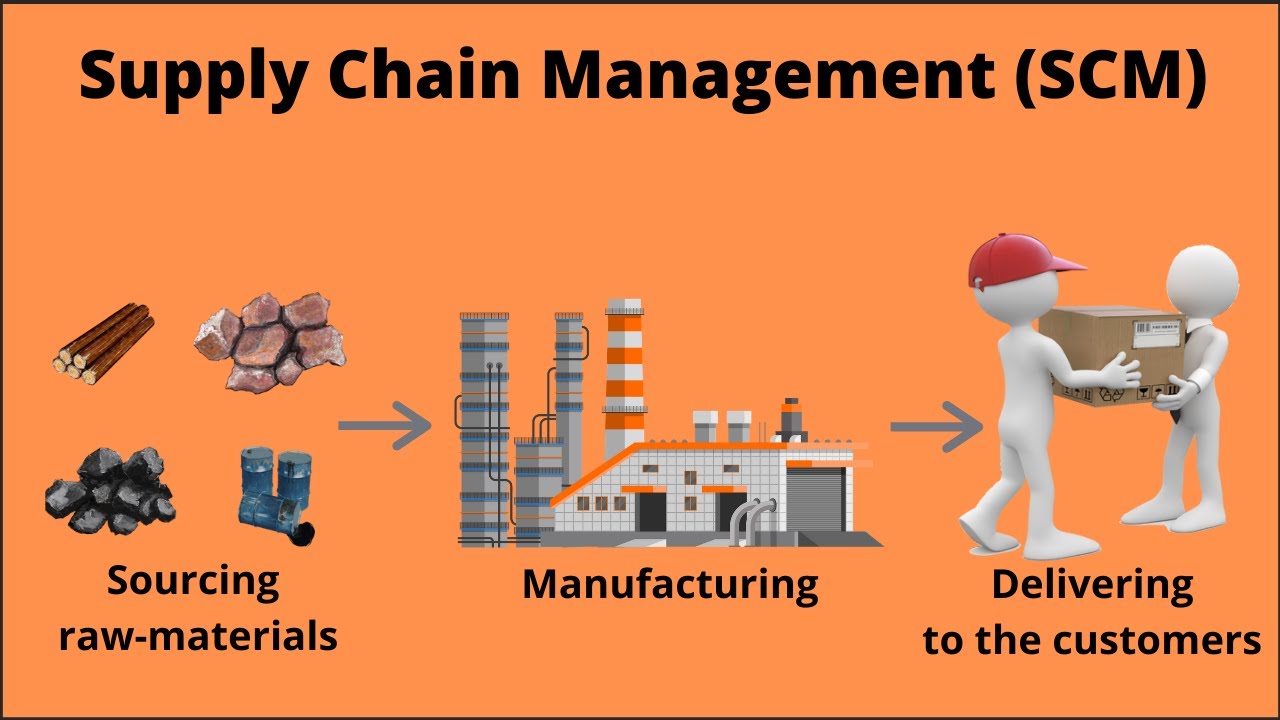What is a supply chain- A supply chain is a network that connects a firm with its suppliers in order to manufacture and deliver a specific product to the end user. Different activities, people, entities, information, and resources are all part of this network.
The supply chain also refers to the stages involved in getting a product or service from its initial condition to its final destination.
Companies create supply chains in order to cut costs and remain competitive in the marketplace.
Because an efficient supply chain results in reduced costs and a shorter production cycle, supply chain management is critical.

What is Supply chain Management ( SCM )? | What is Supply chain?
What Exactly Is Supply Chains?
A supply chain is a set of processes that lead to the delivery of a product or service to a client. Moving and converting raw materials into completed goods, transporting those items, and distributing them to end-users are all phases in the process.
Producers, suppliers, warehouses, transportation firms, distribution hubs, and retailers are all part of the supply chain.
All of the functions that begin with receiving an order and end with satisfying the customer's request are included in the elements of a supply chain. Product creation, marketing, operations, distribution networks, financing, and customer support are among these roles.
The management of the supply chain is a critical component of the businessprocess. There are several connections in this chain that need skill and knowledge.
When supply chain management is done correctly, it may reduce a company's total expenses while also increasing profits. If one link fails, it can have a negative impact on the remainder of the chain, which can be expensive.
What Is The Importance Of Supply Chain Management?
Supply chain management is well known as an integral part of most businesses and is critical to their success and customer satisfaction.
Improving Customer Service
- Customers anticipate receiving the proper product assortment and amount.
- Customers want items to be in the right place at the right time. (For example, if an auto repair shop does not have the essential components in stock and cannot service your automobile for another day or two, customer happiness suffers).
- Customer Expectations for On-Time Delivery — Customers expect items to be delivered on time (i.e., customer satisfaction diminishes if pizza delivery is two hours late or Christmas presents are delivered on December 26).
- Customers want items to be maintained soon after they purchase them. (For example, when a house furnace breaks down in the winter and repairs can't be done for days, customer satisfaction suffers.)
Enhance Your Financial Situation
- Profit Leverage is boosted. Supply chain managers are valued by businesses because they assist regulate and minimize supply chain expenses. This can result in a significant rise in company earnings. For example, because Americans consume 2.7 billion boxes of cereal each year, lowering cereal supply chain costs by only one cent per box would save the business$13 million over five years, resulting in 13 billion boxes of cereal flowing through the enhanced supply chain.
- Reduces the value of fixed assets. Supply chain managers are valued by companies because they reduce the usage of major fixed assets in the supply chain, such as factories, warehouses, and transportation vehicles. If supply chain specialists can rebuild the network such that six warehouses instead of ten can effectively service US consumers, the company will avoid having to build four very expensive facilities.
- Increases the amount of moneyin your bank account. Supply chain managers are valued by businesses because they improve product flow to customers. If a company can produce and deliver a product to a client in 10 days instead of 70, it can invoice the customer 60 days sooner.
Reducing Operating Costs
- Reduces the cost of purchasing. Retailers rely on supply networks to deliver pricey items promptly in order to avoid keeping costly stocks in stores for any longer than required. To minimize excessive inventory expenses, electronics retailers, for example, demand quick delivery of 60" flat-panel plasma HDTVs.
- Reduces production costs. Manufacturers rely on supply networks to reliably deliver materials to assembly facilities in order to prevent material shortages that would cause production to shut down. An unforeseen components shipping delay, for example, that prompts a car assembly plant closure may cost $20,000 per minute and millions of dollars in missed pay each day.
- Reduces total supply chain costs. Manufacturers and retailers rely on supply chain managers to create networks that satisfy customer serviceobjectives at the lowest overall cost. Supply chains that are efficient allow a company to be more competitive in the market. Dell, for example, used an innovative computer supply chain method that involves manufacturing each computer based on a single client order and then sending the device directly to the consumer. As a result, Dell avoided having massive computer inventory languishing in warehouses and retail locations, saving millions of dollars. In addition, because computer technology evolved so quickly, Dell avoided holding computer stocks that may become technologically outdated.
Less well-known is how supply chain management plays an important role in society. Medical missions, disaster relief operations, and other sorts of situations may all benefit from SCM knowledge and skills.
Supply chain professionals pull up their sleeves and go to work, whether dealing with day-to-day product flows or dealing with an unforeseen natural disaster. They identify issues, devise inventive solutions to avoid interruptions, and find out ways to provide vital items to those in need as quickly as feasible.
What Are The Functions Of Supply Chain Management?
The role of global supply chain management consists largely of the five functions listed below:
Purchasing
One of the first duties of supply chain management is purchasing. It is concerned with obtaining raw materials and other resources needed to create the items. It entails working with suppliers to ensure that materials are delivered on time.
It is not only a matter of purchasing items. When acquiring raw materials or other products required to create final goods, there are several factors to consider. All buying operations may have a major influence on a company's sales and profitability.
When acquiring raw materials, it is critical to guarantee that they are of the highest quality for that firm. SCM is responsible for ensuring that only such materials are procured. It is not sufficient to check this once.
They must test these things on a regular basis to guarantee uniformity. Raw materials of varying quality might have a negative impact on finished goods manufacturing. As a result, the product's distinguishing qualities may be lost. A minor blunder in purchasing might jeopardize an organization's reputation.
The prompt arrival of supplies is essential to guarantee that all orders are filled as requested by consumers. It is critical to guarantee that the supply of materials is not disrupted in order to maintain continuous manufacturing without interruption.
Excessive purchasing might result in needless moneyand space consumption. As a result, procurement managers must have up-to-date information on orders and the supplies required to complete them on time.
Operations
The operation team is responsible for demand planning and forecasting. As a result, it sets the stage for inventory management, production, and shipment. Before issuing a raw material purchase order, the organization must forecast the potential demand for a product as well as the quantity of units required.
If demand is overestimated, it may result in excess inventory costs. If demand is underestimated, the institution will be unable to satisfy consumer demand, resulting in revenue loss. As a result, the operation is an important role of the supply chain department.
Production is planned in accordance to demand by operation managers. These officials will be responsible for arranging for raw supplies and ensuring that manufacturing is completed on time to ensure that items are delivered to consumers on time.
They must ensure that all machines operate effectively and without fail in order to finish product production on schedule. They must also guarantee that all other things, such as packing supplies, labels, and stickers, are maintained available for the products that must be delivered to consumers.
The organization of space is another essential function of SCM that comes under operations. Storage space is a high-priced commodity in most Indian cities due to the high cost of real estate.
SC managers must properly manage available storage space to ensure that only needed items are stored in business warehouses. This will need very careful planning of both raw material and finished goods availability to ensure no excess or shortage of inventories.
Logistics
This is a supply chain management role that necessitates a great deal of cooperation. The production of items has begun. It requires storage space until it is transported for delivery. There is a requirement to make local warehousing arrangements.
Assume the items are to be shipped outside of the city, state, or nation. This closes the loop on transportation. Outstation warehouses will also be required. Logistics guarantees that items get to their destination without incident.
Organizing transportation for products is a difficult task. If this entails shipment to foreign countries, it is critical that all documentation be completed correctly by staff employees. Incorrect paper sets could cause issues at both exporting and importing ports. This can cause delays in the delivery of goods to customers.
The logistics manager must be aware of the procedures that businesses must follow when shipping goods to other nations. Varied countries also have different testing standards for certain items.
Even in local material transfer, unanticipated issues might arise. Mechanical difficulties might cause vehicles to be delayed. Supply chain managers must be ready to quickly arrange for an alternate mode of transportation.
Weather and road conditions might cause items to be delayed. The individual must be aware of such information and make preparations to guarantee that items arrive on time. A reliable tracking mechanism must be in place to keep consumers informed of the progress of their orders.
Resource Management
Raw resources, technology, time, and labor are all required by all businesses. However, all procedures must be efficient and effective. The resource management function team is in charge of this phase.
It determines the allocation of resources to the right activity at the right time in order to optimize production while lowering costs. A major responsibility here is to properly assign people to various jobs in order to ensure that all work is completed on time. The workforce is critical in moving goods and ensuring proper order execution.
Managing resources is difficult in companies when the same machinery is used to make various goods. To allocate machines for each item, resource managers must know how many orders in each item are to be performed.
Other machinery is required to complete finished goods production. The supply chain department's functions also include the arrangement of devices for packing and labeling goods.
When there are a high number of orders to be executed, time is another limitation. These professionals must determine whether a single shift is sufficient to complete a job or whether additional shifts are required.
As a result, they must ensure that people are available to work additional hours. These managers must also assess the cost of employing additional resources to increase output and guarantee that it does not negatively impact profitability.
Information Workflow
The exchange and distribution of information is what keeps all other aspects of supply chain management running smoothly. If the information process and communication fail, the entire chain may fall apart, resulting in mismanagement.
In terms of logistics, data must flow in both directions. In this procedure, regular information sharing between external and internal organizations is also required.
Details on orders in hand and market trends will be included in downstream information. These particulars are critical for ensuring that sufficient amounts of raw materials are accessible.
Understanding market trends from retailers and distributors will aid in the development of sales predictions. Companies cannot plan for production without such forecasts. Organizations must also plan for financing if there is a need to boost output due to an unexpected rise in demand.
One of the most important aspects of supply chain management is the procurement of raw materials. To do this flawlessly, the official in charge must have up-to-date information on the availability of various materials.
If they are aware of any shortages ahead of time, they will be able to purchase excess and ensure that production runs smoothly. Price increase news is also necessary for correcting finished goods prices or looking for other economic sources for such items.
We realized how critical it is for all businesses to have effective supply chain management in place. It is important to examine in depth the aims that this function delivers.
What Is The Goal Of The Supply Chain?
On the most basic level, the goal of supply chain management is to ensure that inventory is easily available in customer-facing positions in order to meet demand. The saying in the fresh fruit industry, "you can't sell from an empty wagon," emphasizes the primary function of supply chain management.
What Makes A Successful Supply Chain Leader?
Leaders in the supply chain must be process experts. They should also understand how technology and the market in general are influencing the supply chain. This implies that they must be able to adapt to it. Finally, they must use their existing relationships to expand their network.
What Type Of Person Should Work In Supply Chain?
Supply chain managers are typically enterprising individuals, which means they are natural leaders who thrive on influencing and persuading others. They are also typically conventional, which means they are detail-oriented and organized, and prefer to work in a structured environment.


